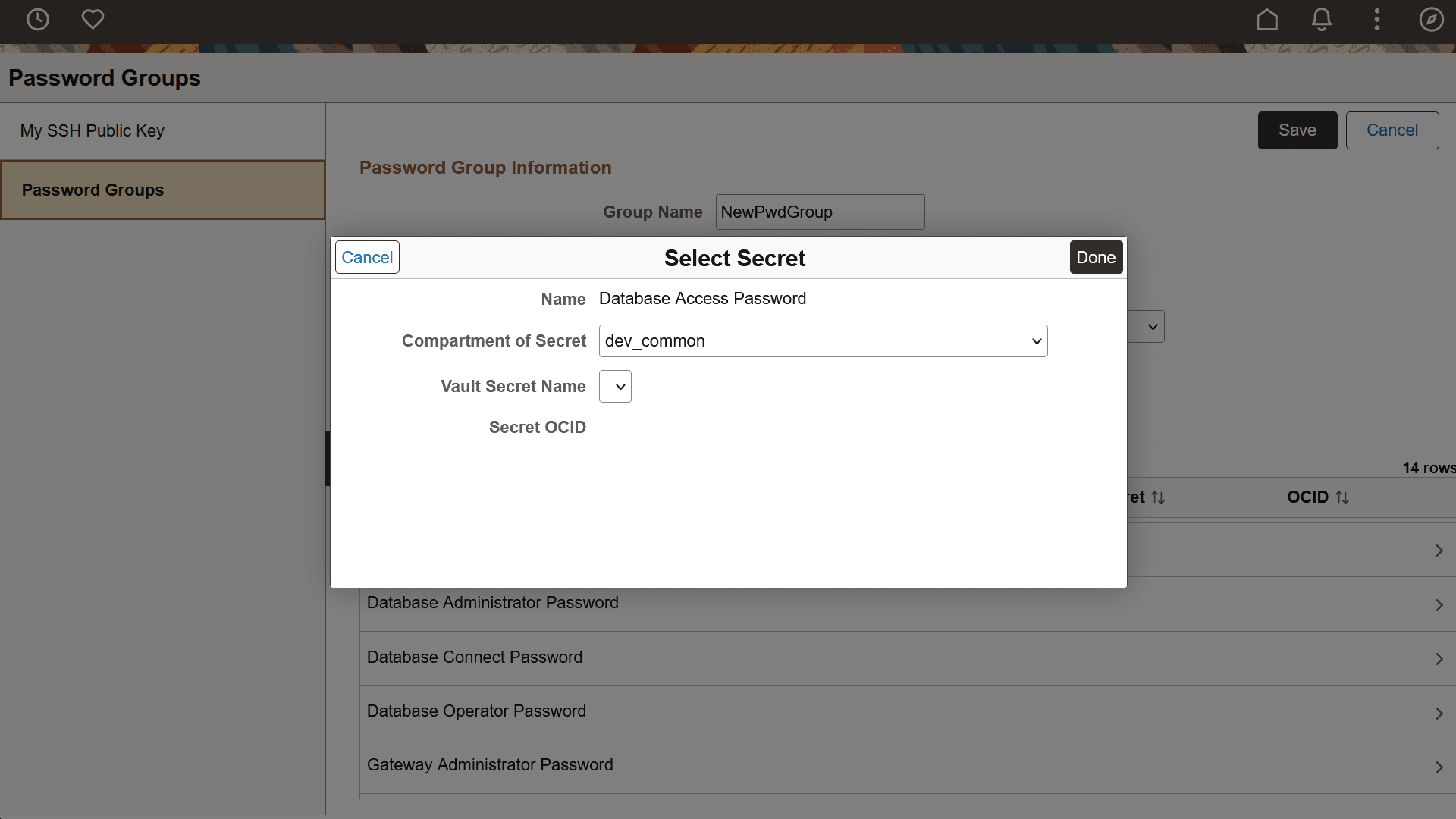Configuring My Settings
Use the My Settings tile (ECL_INFO_HOME_FL_GBL) to access My SSH Public Key page and Password Groups page.
Navigation:
My Settings tile is delivered as part of the Cloud Manager home page.
This example illustrates the My Settings tile.

Use the My Settings page (ECL_INFO_HOME_FL) to enter or edit the public SSH key. The SSH key provided here can be used to input SSH keys belonging to you or any administrator to help manage or troubleshoot issues by connecting over SSH.
Note: The SSH key will be automatically added into all environments that will be created by the user after adding this key here.
Navigation:
Click the My Settings tile on the delivered Cloud Manager Fluid home page. The My SSH Public Key page is displayed.
This example illustrates the fields and controls on the My SSH Public Key page.
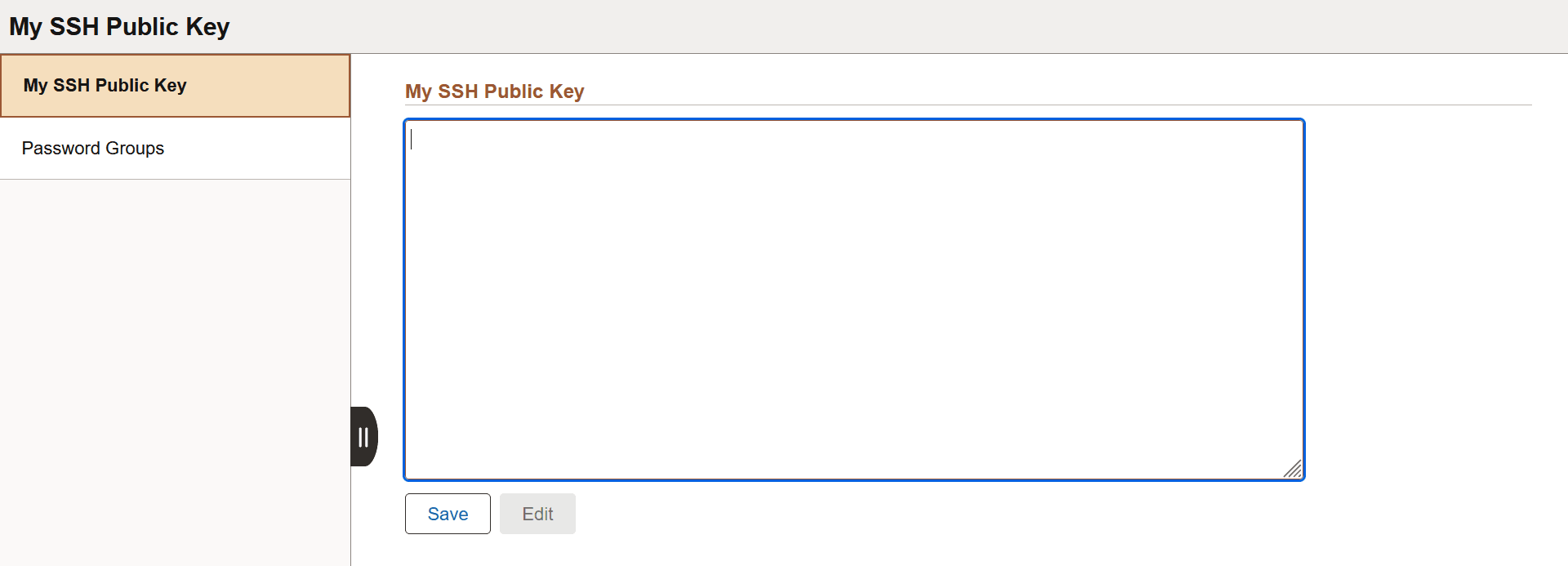
Field or Control |
Description |
|---|---|
My SSH Public Key |
Enter the SSH public key value. |
Click Save to save the details.
Note: To edit existing key details, click the Edit button and replace the text; then click Save.
Use the Password Groups (ECL_PWDMANAGER_FL) page to centrally store and reuse the passwords that are already created as secret OCIDs in the secure password storage mechanism called OCI Vault, so that you need not manually enter the passwords while performing environment provisioning, importing environment, or during shift operation.
OCI Vault lets you securely store master encryption keys and secrets that you might otherwise store in configuration files or in code. See Vault Overview to know more about using keys and managing secrets. The Password Groups page on Cloud Manager lets you leverage this facility in OCI Vault, so that you need not manually enter the passwords.
Note: You can also manually enter the passwords while provisioning an environment.
This example illustrates the fields and controls on the Password Groups page. You can find definitions for the fields and controls later on this page.
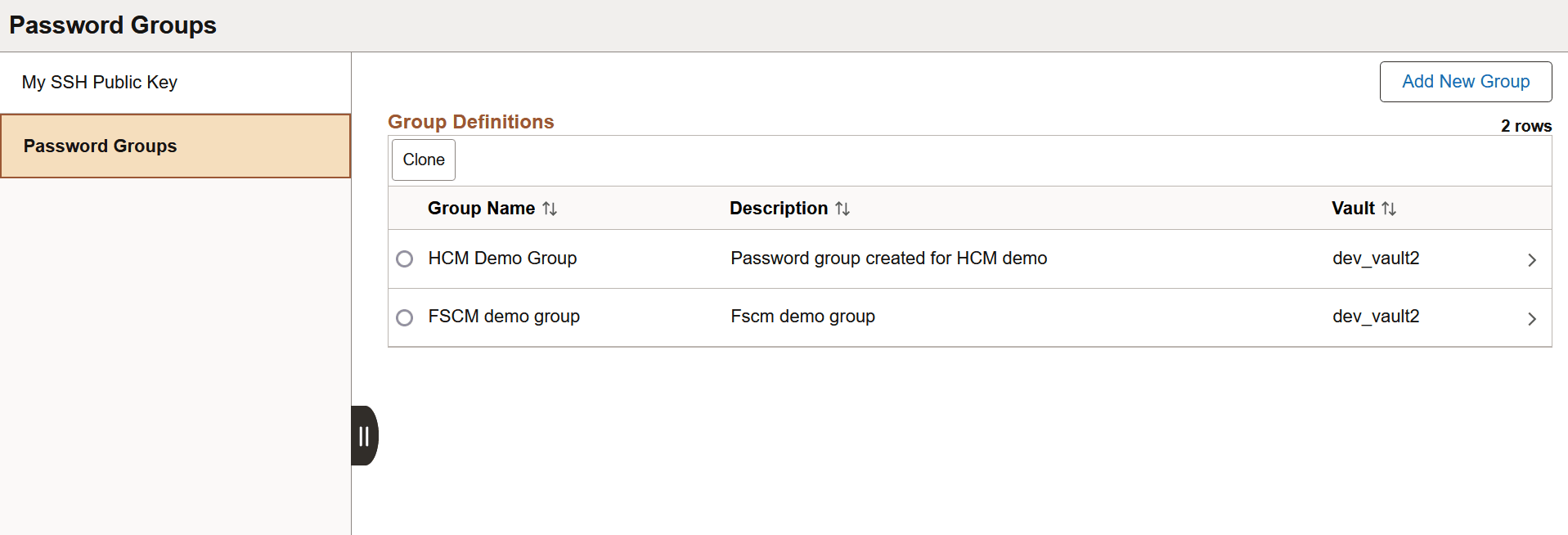
|
Field or Control |
Description |
|---|---|
|
Clone |
Click the button to clone an existing password group listed on the Password Groups page. |
|
Add New Group |
Click the button to add a new password group. |
The existing password groups are listed under the Group Definitions section on the Password Groups page. When you click any row listed on the Group Definitions section, the password group information is displayed.
Cloning an Existing Password Group
You can copy all the password details of an existing password group by clicking Clone button on the Password Groups page.
Note: You can edit or delete the newly cloned password group as long as it is not associated with an environment.
This example illustrates the fields and controls on the Password Groups page, when you clone an existing password group. You can find definitions for the fields and controls later on this page.
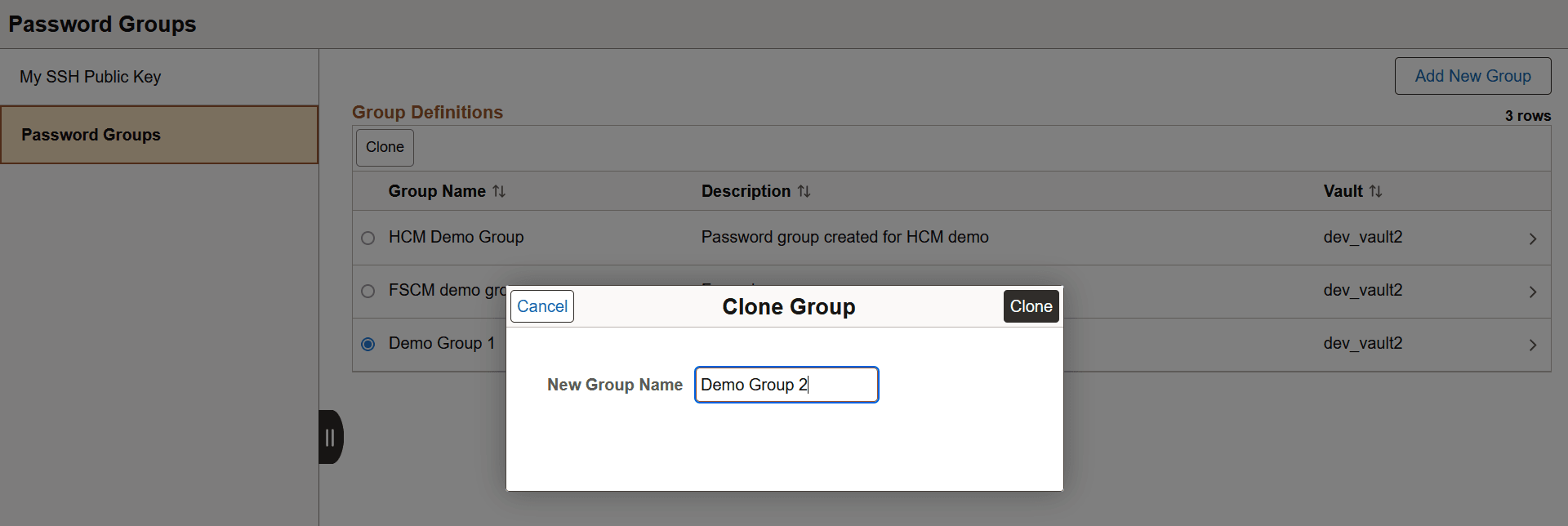
|
Field or Control |
Description |
|---|---|
|
New Group Name |
Enter a unique name for the cloned password group. |
The following passwords can be mapped to an existing secret in the selected OCI Vault:
ADB Wallet Password
Database Access Password
Database Administrator Password
Database Connect Password
Database Operator Password
Gateway Administrator Password
RMAN Backup Encryption Password
Search Proxy Password
Source TDE Keystore (Wallet) Password
TDE Master Key secret password
Web Profile Password for user PTWEBSERVER
Weblogic Administrator Password
Windows Administrator Password
This example illustrates the fields and controls on the Password Groups page, when you clone password group. You can find definitions for the fields and controls later on this page.
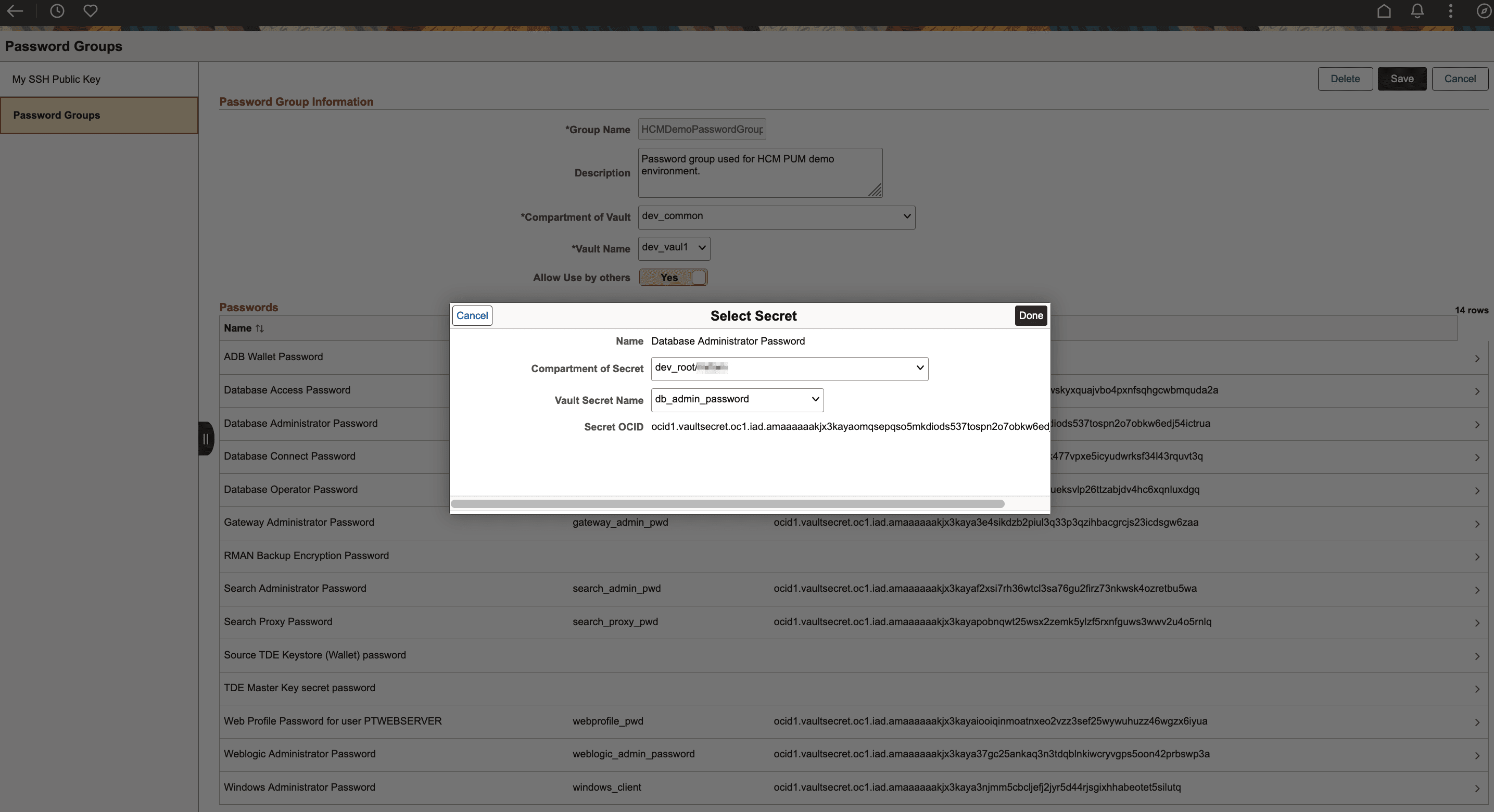
|
Field or Control |
Description |
|---|---|
|
Group Name |
Enter a unique name for the password group. This is a required field. |
|
Description |
Enter a brief description of the new password group. |
|
Compartment of Vault |
Select the compartment from OCI Vault, which contains the secrets. This is a required field. |
|
Vault Name |
Select the OCI Vault Name from the drop down list. This is a required field. |
|
Allow Use by others |
Select Yes to allow the password group to be accessed by other users. The default value is No, which keeps the password group private. |
|
Compartment of Secret |
Select the compartment from OCI Vault, which contains the selected password. |
|
Vault Secret Name |
Select the secret name contained in OCI Vault from the drop down list. |
The selected secret details are displayed in Passwords section. You can also choose to leave secrets blank, if you do not wish to set them.
Adding New Password Groups
You can create a new password group to add the secret OCIDs that are already created in the secure password storage mechanism called OCI Vault.
The following passwords can be mapped to an existing vault secret:
ADB Wallet Password
Database Access Password
Database Administrator Password
Database Connect Password
Database Operator Password
Gateway Administrator Password
RMAN Backup Encryption Password
Search Proxy Password
Source TDE Keystore (Wallet) Password
TDE Master Key secret password
Web Profile Password for user PTWEBSERVER
Weblogic Administrator Password
Windows Administrator Password
This example illustrates the fields and controls on the Password Groups page, when you create a new password group.
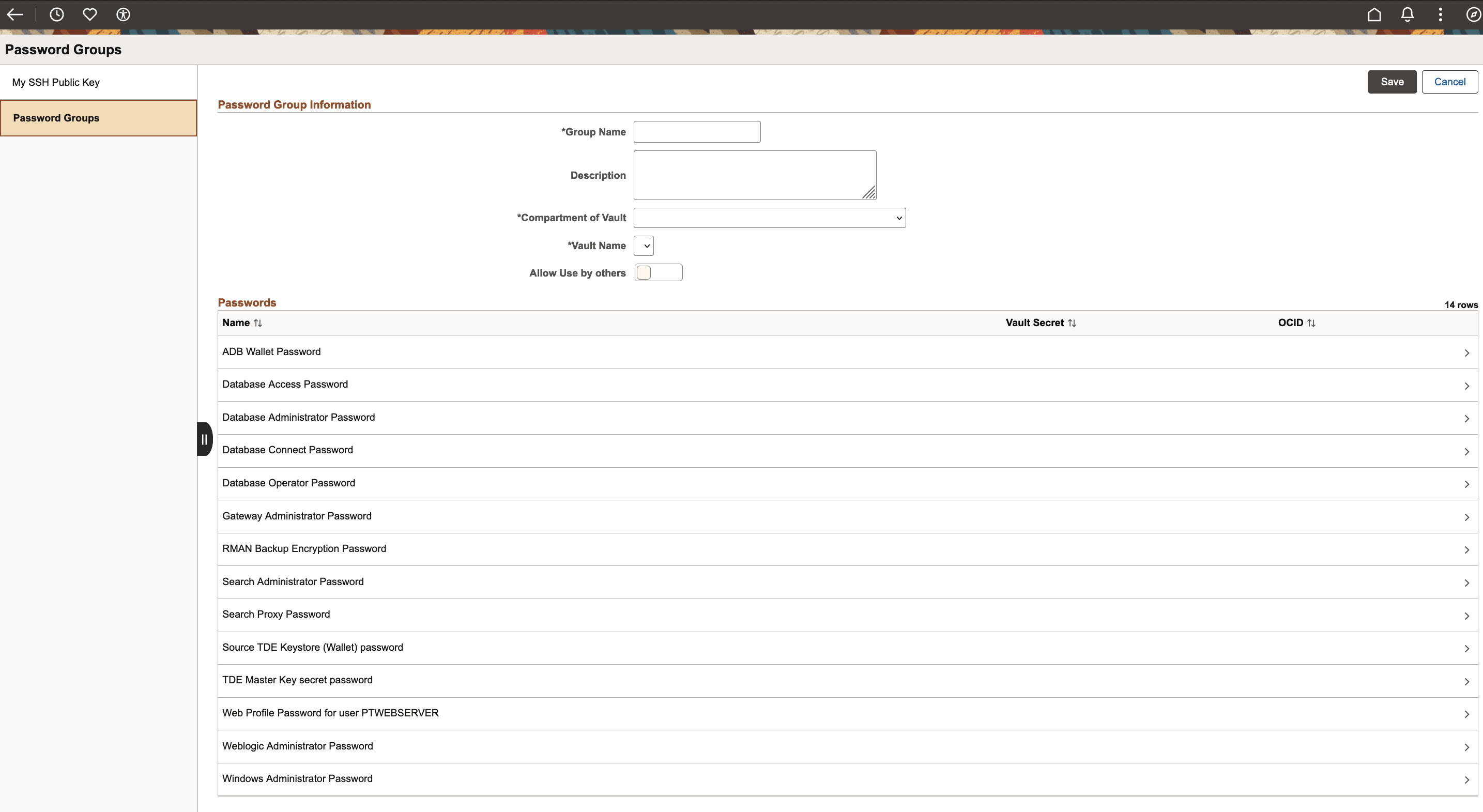
Click Save to save the password group information. You can edit the password details except name, and empty secrets, even after a password group is associated with an environment. However, you cannot delete the password group if it is associated with an environment.
When you create a new password group, the compartment of the secret is selected by default, which is the same as the vault compartment. You can change the selection if required.
This example illustrates the fields and controls on the Password Groups page on selecting secret for a newly created password group.
